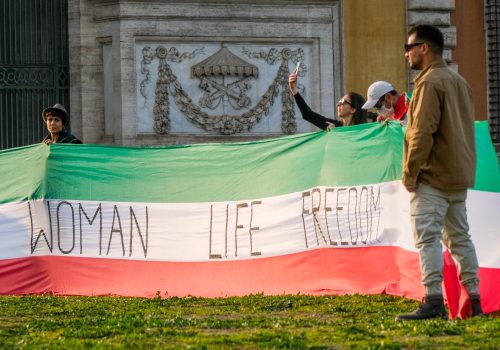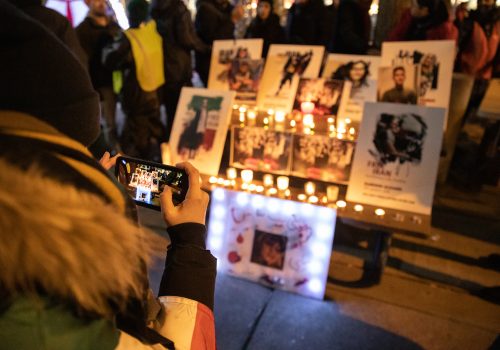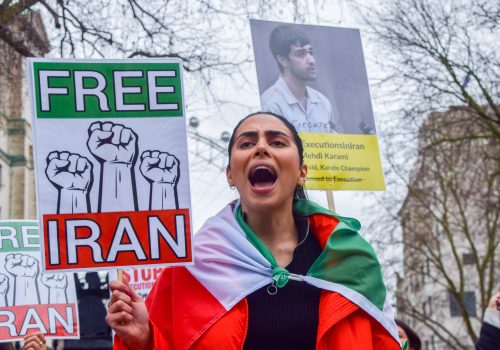The Islamic Republic is waging a war on women journalists. The international community needs to step up.
Since the eruption of mass anti-government protests in mid-September 2022, the Islamic Republic has waged a war on women journalists in Iran. The targeting of journalists is not new. However, security forces have deliberately gone after women journalists and jailed them at a rapidly increasing rate. While the international community has spoken out in support of the Women, Life, Freedom revolution, they have done little to protect the women journalists at the heart of this movement.
In September 2022, Niloofar Hamedi and Elahe Mohammadi were imprisoned on alleged charges of espionage. They had attempted to report on the death of twenty-two-year-old Mahsa Jina Amini—a Kurdish-Iranian woman who had been killed by the so-called morality police for “violating” mandatory hijab. Hamedi wrote for the reformist newspaper Shargh and was the first journalist to report on the death of Amini, doing so from the hospital in Tehran where Amini had been on life support. Mohammadi had reported on the protests at Amini’s funeral in her hometown of Saqez in northwest Kurdistan province.
In January of this year, journalist Nazila Maroufian revealed that she had been jailed and sentenced to two years on alleged charges of “anti-government propaganda and spreading false news” after publishing an interview with Amini’s father, Amjad Amini.
These three women and their experiences do not exist in a vacuum. The targeting of female journalists has been a direct response to the rise of the Women, Life, Freedom movement in Iran. More than seventy journalists have been imprisoned in Iran since the beginning of the protests, 44 percent of whom are women. This is an unprecedented number in Iranian history.
According to journalist and activist Yeganeh Rezaian, a senior researcher at the Committee to Protect Journalists (CPJ), the Women, Life, Freedom uprising would not exist without female journalists.
“The Women, Life, Freedom movement was started by the unfortunate death of a woman, but also by women’s coverage of that terrible incident. So, if it was not for those first two female journalists who covered the death of Mahsa Amini, there would be no clarity about what had happened to her,” Rezaian explained to me.
What the constitution says
This phenomenon is not limited to Iranian journalists covering the ongoing protests. The Islamic Republic has a long history of jailing journalists as well as subjecting them to extreme censorship and political pressure.
Under the Islamic Republic, the legal framework for freedom of the press is constituted by a combination of sharia law and Islamic cultural norms. While there are provisions within the Constitution of the Islamic Republic of Iran developed in 1979 that protect freedom of expression and address the freedom of the press, these provisions are often overlooked or subjected to severe restrictions.
Article 24 of the Constitution establishes the rights of the press to freedom of expression, yet they are subject to exceptions in favor of the principles of Islam and the rights of the public. Article 168 of the Constitution reinforces the restrictions on the freedom of expression by laying out the procedures relating to offenses by the press. The 1986 Iranian Press Law established the Mission of the Press, the Rights of the Press, and the Limits of the Press. The provision regarding the limitations placed upon the press would prove to be the most significant in justifying contemporary restrictions of the press.
By adopting rhetoric pointing to national security concerns and the spread of propaganda, the Islamic Republic has abused its jurisdiction over national security. The Iranian state uses national security charges as an increasingly transparent façade for the wrongful detention of journalists in an effort to eliminate criticism of the regime and prevent the exposure of other human rights violations they have committed.
Waging war on women journalists
Rezaian claimed that the current targeting of female journalists is not shocking. She has commented that these efforts have become so prolific that they no longer attempt to hide the detention of journalists, noting that they are shameless in raiding these women’s homes without warrants and providing purpose for their imprisonment.
CPJ has declared the Islamic Republic the worst jailer of journalists in the world for 2022. The sheer number of detentions is worsened by the conditions in which these women journalists are being treated. Journalists in Iran are subjected to poor prison conditions, including being frequently kept in solitary confinement. Furthermore, female journalists are specifically targeted as victims of sexual harassment and sexual assault.
So, while the international community says that they stand with the women of Iran, they must step up in the face of a war against female journalists and ensure that they are given the freedom to continue to fight for the rights of their peers.
Freedom of the press in the international community is addressed through numerous bodies of international law. UNESCO declares that access to information is a fundamental freedom as well as an integral component of freedom of expression. The International Covenant on Civil and Political Rights, which the Islamic Republic of Iran has ratified, holds that everyone shall have the right to freedom of expression. This includes the freedom to “seek, receive, and impart information and ideas of all kinds, regardless of frontiers, either orally, in writing or in print, in the form of art, or through any other media of his choice.” The blatant dismissal of these rights by the Islamic Republic must be recognized and condemned by the international community.
There are other ways to hold the Islamic Republic accountable, including the use of targeted financial sanctions and travel bans against companies and individuals that are responsible for the unjust treatment of journalists. Additionally, European Union states could summon their ambassadors back to their countries in protest of the wrongful detentions and the harsh treatment of female journalists. Lastly, countries with universal jurisdiction laws can and should investigate the detentions of women journalists to bring the individuals responsible to justice.
As women journalists risk their lives to share the realities of the Islamic Republic’s brutality with the world, the international community must support them with deliberate action.
Britt Gronemeyer is a Young Global Professional at the Atlantic Council’s Rafik Hariri Center and Middle East Programs.
Further reading
Thu, Feb 23, 2023
Iran’s ‘women, life, freedom’ revolution has a manifesto. Here are the next steps.
IranSource By
Signed by twenty organizations and released on February 13, the manifesto gathered the support of many civil society organizations in Iran.
Thu, Jan 5, 2023
An Iran opposition coalition was long overdue. It’s an important step forward on the rocky road to change.
IranSource By
Such a coalition is an important step forward to grant the millions-strong Iranian diaspora a unified and, thus, more effective voice to push the international community.
Thu, Feb 9, 2023
Forty-four years of an Islamic Republic. Many now regret the 1979 revolution.
IranSource By
While there are disagreements over many aspects of the 1979 revolution, most Iranians agree that the country is in a far worse situation because of it.
Image: A woman holds a cardboard reading 'Niloofar Hamedi, journalist who discovered the Amini story, has been arrested by the morality police'. Iranians of Toulouse organized a protest in Toulouse in solidarity with women and protesters in Iran, following the death of the young Iranian woman, Mahsa Amini, who died after being arrested by the Islamic republic's 'morality police'. Several hundreds of people participated to the protest. Police have said Amini fell ill as she waited with other women held by the morality police, who enforce strict rules in the Islamic republic requiring women to cover their hair and wear loose-fitting clothes in public. Since the death of Mahsa Amini, many protest took place in Iran, the NGO Iran Human Rights says that many protesters have been killed. The death of Mahsa Amini sparked protests worldwide. Toulouse. France. December 3rd 2022. (Photo by Alain Pitton/NurPhoto)


